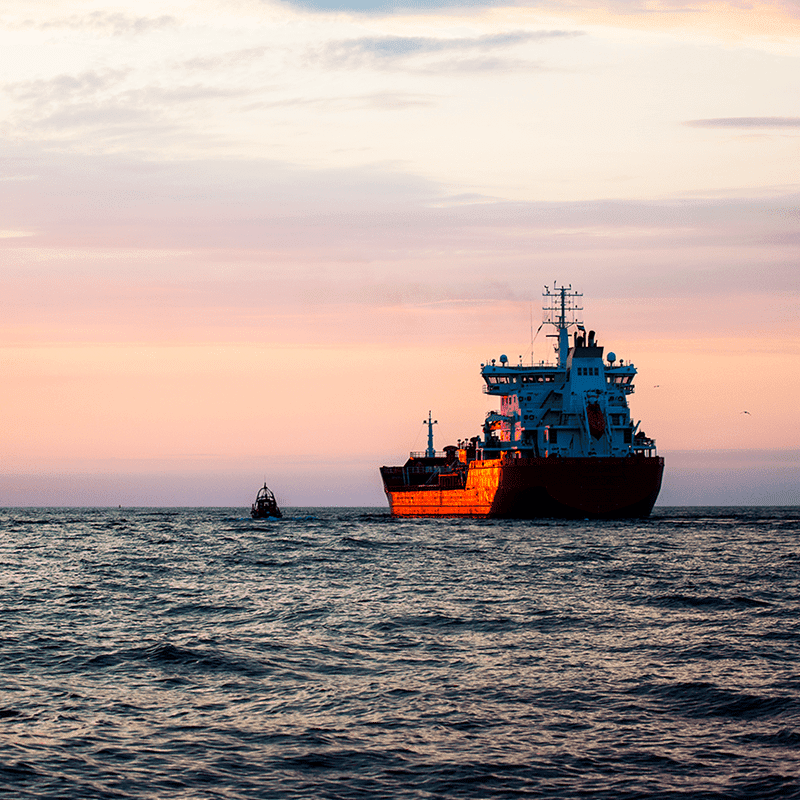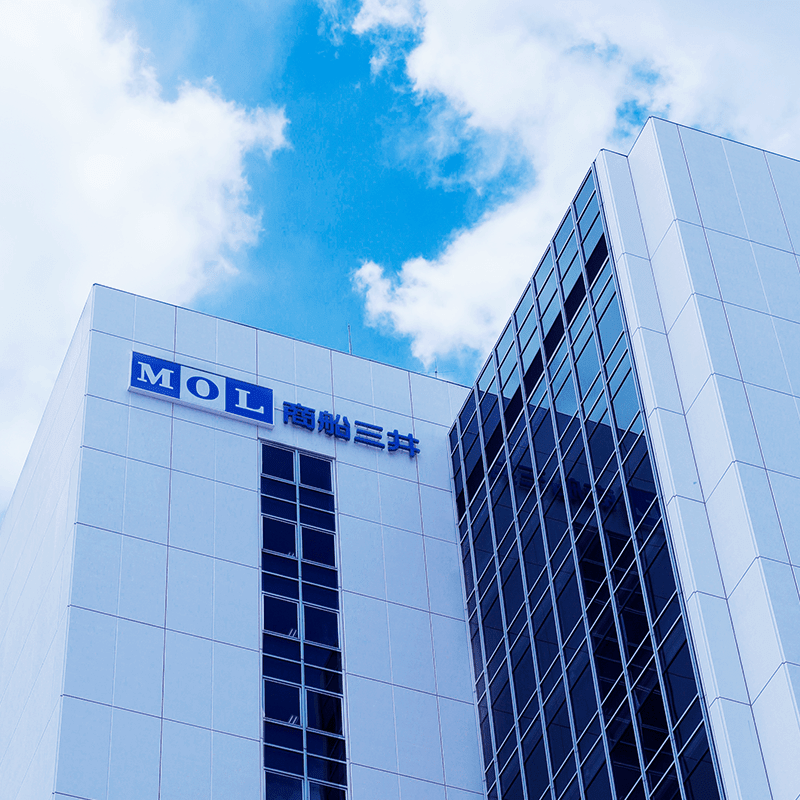BLOG
What is the life cycle of large ships? (1)
- General Shipping
2021.08.19
Even large ships which travel the world's oceans every day have a lifespan. Our first LNG carrier, ”Senshu Maru”, came into service in 1984 and ended its 37 years of service in January 2021.It has reached the end of its life. Where will the ship go? In this blog, we will introduce the current status of scrapping (dismantling) of large ships and the subsequent recycling of its parts (ship recycling). The blog will be divided into two parts, and in this first part we will provide an overview of ship recycling, international conventions on ship recycling, and the status of major ship recycling countries.
What is Ship Recycling...?
Ship recycling is a series of processes to scrap ships that have technically or economically reached the end of their service life, and to reuse the resources obtained (reference: Class NK). Though it depends on the cargo to be transported and navigation standards, the period between completion of building and scrapping ("the ship life") is generally around 20 years. There are a variety of "ship recycling" scenarios, such as used LNG carriers sometimes converted into FSRUs, but in this blog we focus on ship recycling that involves scrapping.
It is said that about 95% of a ship by weight is recyclable. After scrapping ships, steel materials, non-ferrous metals, furniture, marine products, pumps, engines, generators, etc. are reused.
Ship recycling is a labor-intensive job, major recycling facilities are located in developing countries. Problems related to the management of hazardous materials handled during scrapping, the environmental impact, and the health and safety management of the workers at the recycling yards, have been recognized internationally.
Find more:
https://www.nationalgeographic.com/magazine/article/The-Ship-Breakers
Then, International organizations such as International Labour Organization (ILO) and International Maritime Organization (IMO) have started to take concrete actions to improve the situation, and at the end of 2005, IMO general meeting resolved to start working on a new convention. After that, the Ship Recycling Convention, so-called "the Hong Kong Convention" was adopted in 2009. Let's take a closer look at the Hong Kong Convention and Europe’s regulation on ship recycling that was established independently.
Status of Ratification of the Ship Recycling Convention
The official name of the convention of the above is “the Hong Kong International Convention for the Safe and Environmentally Sound Recycling of Ships, 2009”, which was adopted at an IMO conference in Hong Kong. The objective of the convention was to ensure occupational safety and the proper disposal of hazardous materials in the recycling yards.
The convention was adopted mainly by international organizations with the cooperation of each government, but unfortunately, as of 2021, the convention has not yet come into force. Ratification requires the following 3 conditions:
(1) Ratification by 15 States
(2) Representation by 40% of world merchant shipping by gross tonnage
(3) A maximum annual ship recycling volume not less than 3% of the combined tonnage of the ratifying States
In the autumn of 2019, India, a major ship recycling country, ratified the convention, which completed the first requirement of the convention(above (1)), still leaving the other two conditions outstanding.
And, Bangladesh becomes a key country for the convention to come into force. Bangladesh, which is a major ship recycling country for China, is working with international organizations and individual governments to ratify the convention by 2023. Even though the convention has not come into force yet, actually it is widely used by shipowners in developed countries as a criterion for selecting scrapping yards (determining work processes and safety standards).
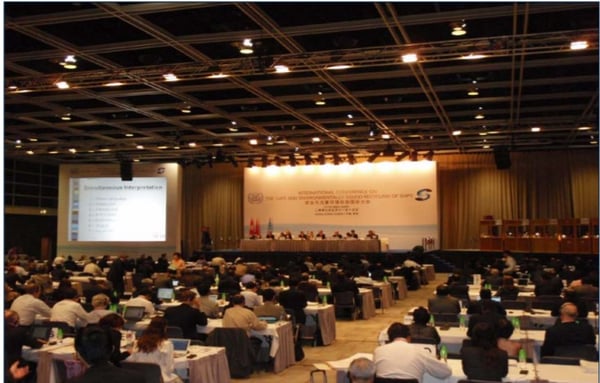
Source: Nippon Kaiji Kyokai, "The Ship Recycling Regulation Update (October 2019)"
Europe’s regulation on ship recycling
Where are the major Ship Recycling countries?
Where does the scrapping of large vessels take place?
Asia has the World's major ship recycling yards, (particularly South Asia). Basis DWT , Bangladesh accounts for about half (46.3%) of total ship recycling, and together with India and Pakistan the three countries account for about 90% of total ship recycling in 2020.
Turkey also has a long history as a ship recycling country, even the volume of recycling is not large compared with above countries. They mainly handle the scrapping of EU-flagged ships, including many smaller ships and cruise ships.
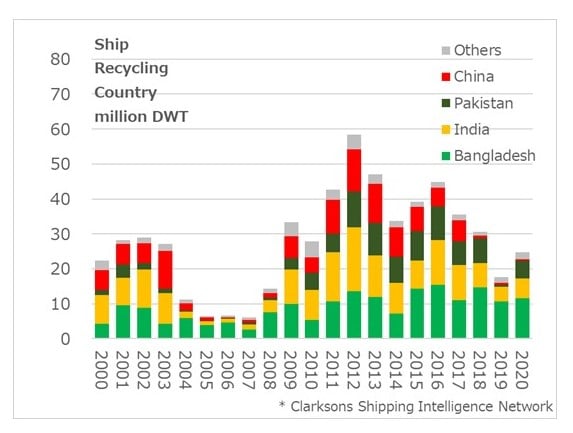
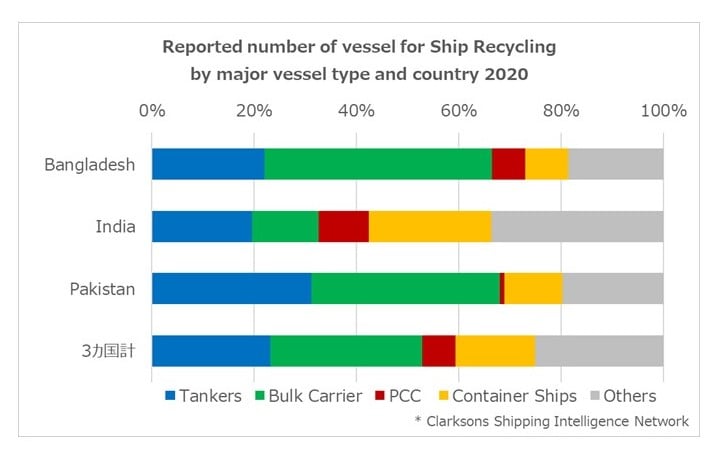 created by MOL
created by MOL
Status of major Ship Recycling countries
(1) Bangladesh
In Bangladesh, a lot of major ship recycling yards are located in Chittagong. As mentioned above, the country is a key area in enabling the coming into force of the Hong Kong Convention. The government has prepared for the ratification by introducing a domestic law in 2018 which is a significant step towards ratifying the Hong Kong Convention by 2023.
At the same time as promoting domestic legislation, Bangladesh is receiving support from the international community, and has been working on Safe and Environmentally Sound Ship Recycling in Bangladesh project (SENSREC) since 2015 under the leadership of IMO. In addition, cooperation between international organizations and countries is advancing for the early ratification of the Declaration. For example, the Government of Norway has committed approximately US $1.5 million towards supporting improved ship recycling in Bangladesh. And also in November 2020, Japanese government officials and an ambassador to Japan in Bangladesh visited the scrapping yards and promised their cooperation for further improvements.
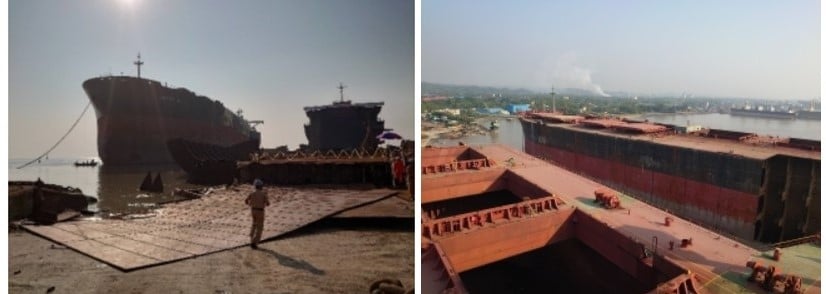 Source: Website of the Embassy of Japan in Bangladesh
Source: Website of the Embassy of Japan in Bangladesh
(https://www.bd.emb-japan.go.jp/itpr_ja/11_000001_00236.html)
Status of major Ship Recycling countries
(2) India
In India, major recycling place is Alang. Since 2016, the Indian Register of Shipping (IRClass) has been supporting the scrapping works in Alang by setting safety standards for scrapping work, ensuring the health and safety management at the work site, and improving the work environment. As of March 2021, IRClass have certified ISO of 40% of recycling yards at there.
With the recognition of these efforts, India ratified the Hong Kong Convention in 2019. Specifically, IRClass has introduced a training program for workers and only qualified workers with 12 days of training were allowed to work in ship recycling in Gujarat. As a result of these efforts, the number of fatal accidents in 2019 was reduced by 90% from the previous year and are said to be close to 0 for 2020. Additionally, a hospital was newly built in Alang by the local maritime authorities in 2019.
Following the ratification of the Hong Kong Convention, India has been focusing its efforts on scrapping work, and plans to double its scrapping capacity by 2024 (doubling from 4.5 million tons and creating 150,000 new jobs), aiming to increase its global share from 30% to 50% by attracting recycling ships from Japan and Europe.
The Japanese public and private sectors played a major role in the ratification of the convention in India, and the Japanese government has supported the improvement of yards in India with ODA (Official Development Assistance). The Japanese Shipowners ’ Association has also dispatched its staff to the country to help establish a safety training center and provide protective equipment. The ship recycling relationship between India and Japan is strong, and ClassNK has now certified 40 recycling yards.
Status of major Ship Recycling countries
(3) Turkey
Turkey (Ariaga), which has a geographical advantage due to its proximity to Europe, has been involved in the recycling industry. Several recycling yards have been approved by the EU-SRR and operate as official European recycling yards, (in particular, two yards, Leyal Gemi and Sokum-in, have joined the EU Approved List as the first recycling yards outside the EU). Many European shipping companies have certified yards that meet the standards of EU regulations. According to our Chief Country Representative in Turkey who inspected the yard, the whole yard was systematically operated and modernized, and health and safety management was also carried out in an organized way. (Reference: Hellenic Shipping News Worldwide, 2018). Also, as mentioned earlier, Turkey ratified the Hong Kong Convention in 2019.
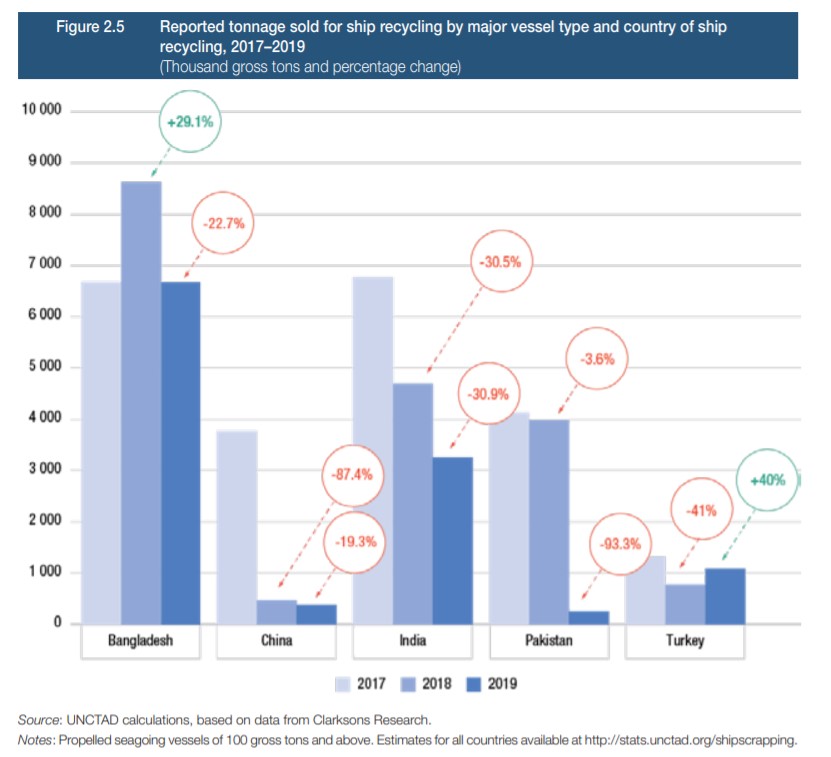
Source: UNCTAD ” Review of maritime transport 2020 ”
In 2020 it became difficult to operate cruise ships due to the COVID-19 pandemic. Several shipping companies decided to scrap their “aging vessels”, and Aliaga became flooded with ships scheduled for scrapping. Luxury passenger cruise ships are waiting for their turn to be scrapped at several recycling yards. Also, Royal Caribbean and Carnival are reported to be in the process of scrapping their cruise ships in Turkey.
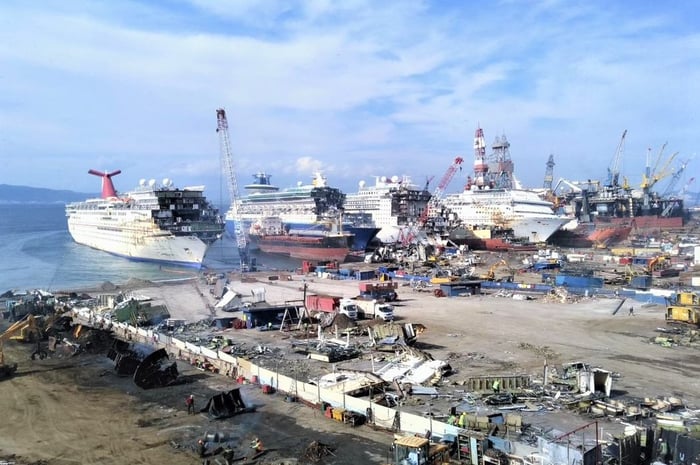
After the ship is scrapped, items to be recycled (steel scrap, ship’s interior ornaments, furniture, etc.) are removed from the ship. Since the steel industry in Turkey is mainly based on electric furnaces, scrap will be remanufactured in steel mills and reused as new raw materials.
(Reference: Turkey is the world's largest importer of steel scrap)
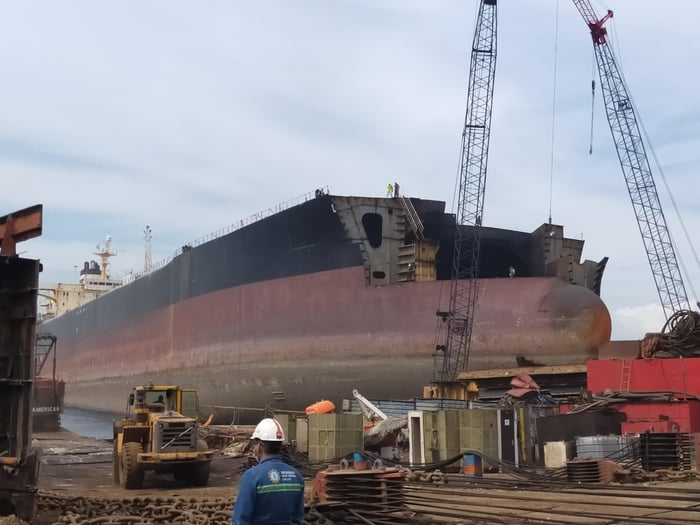 Photos by MOL Chief Country Representative in Turkey)
Photos by MOL Chief Country Representative in Turkey)
We started with what is ship recycling, followed by related international conventions, regulations, and the situation in some major ship recycling countries. One of the missions of shipping companies is to fulfill their "Responsible Consumption and Production" obligations from the birth of a ship to its final demise. The ship recycling from the aspect of the global environment and health and safety at the recycling yards is extremely important in helping build a sustainable society. From the position of making effective use of resources, ship recycling is also an important initiative in creating a ‘Circular Society’, and MOL group is making concerted efforts toward this goal. In the second part, we will introduce other ship scrapping countries and the efforts of shipping companies.
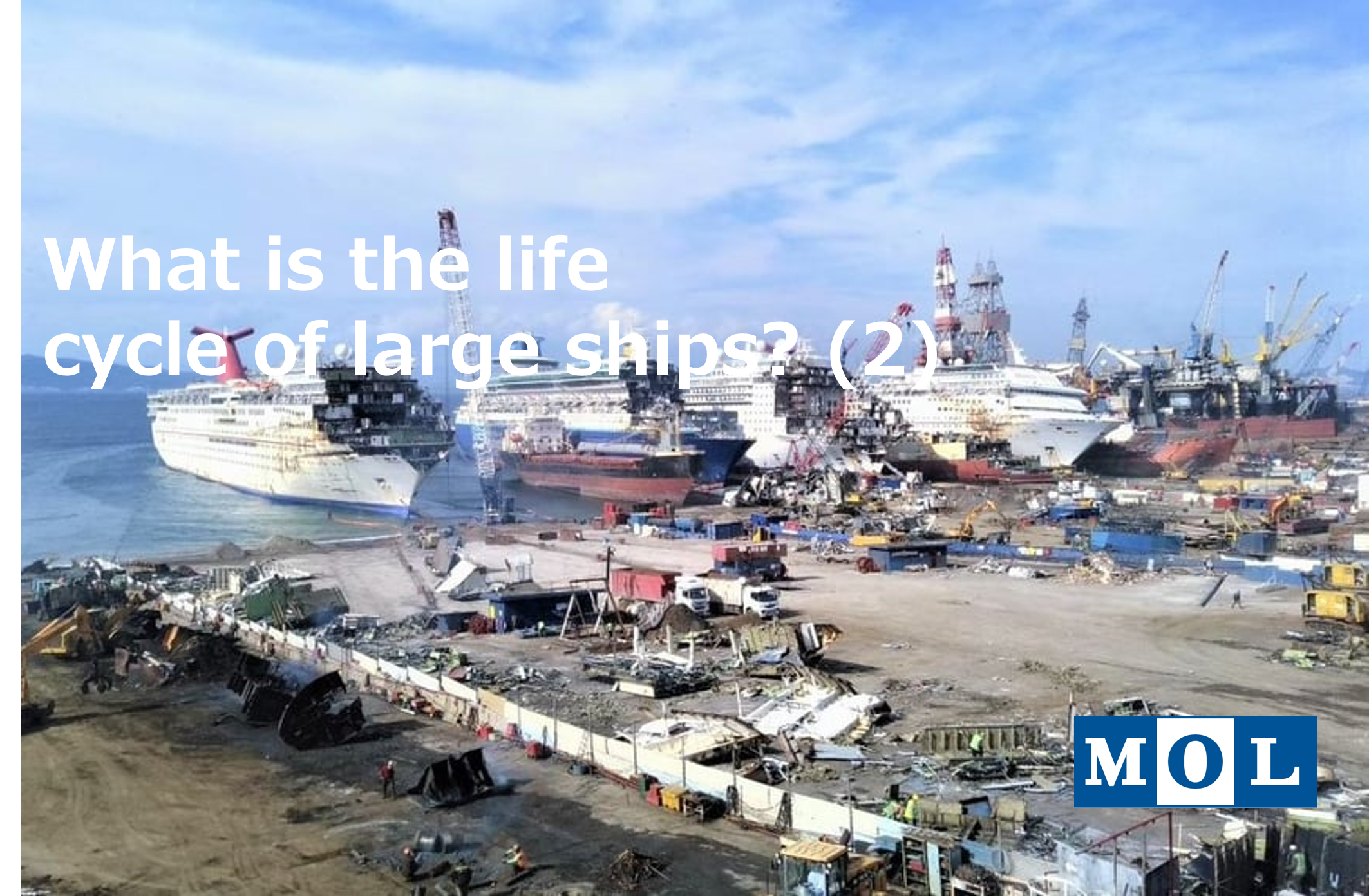

Writer:Akina
Joined MOL in 2014 after working for a credit card company. After being in charge of car carriers administration, operating bulk carriers, now I’ve been involved in the operation of this website, in the marketing division. I'm also in charge of website news letter. Easy to subscribe, please click below!
Recommended Articles
2022.07.05
- General Shipping
2021.04.13
- Energy
2025.03.18
- General Shipping
2021.08.07
- Eco Friendly
Latest Articles
2026.02.02
- Eco Friendly
- General Shipping
2026.01.20
- Eco Friendly
- General Shipping

.png)



